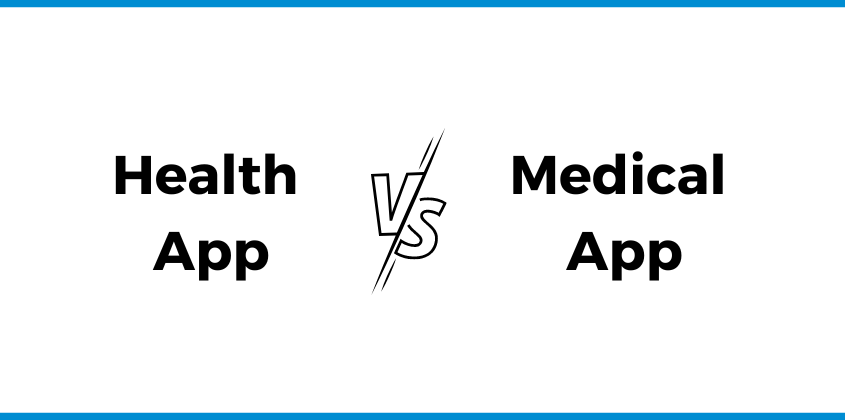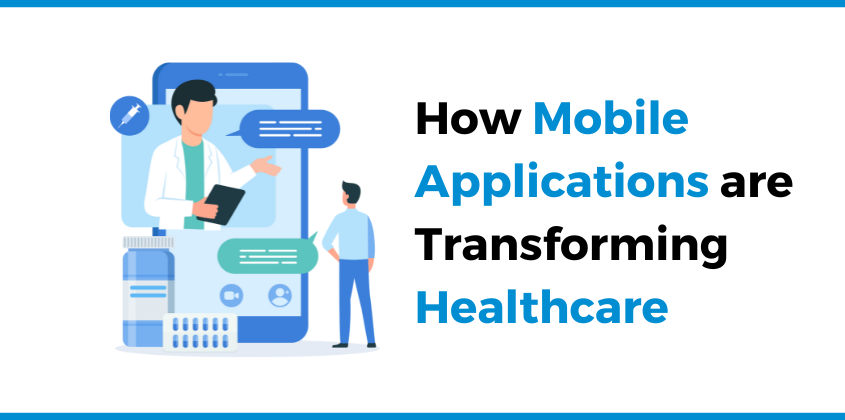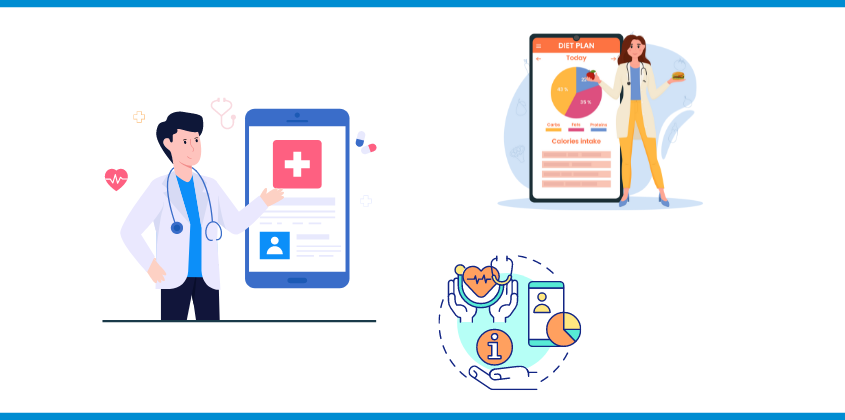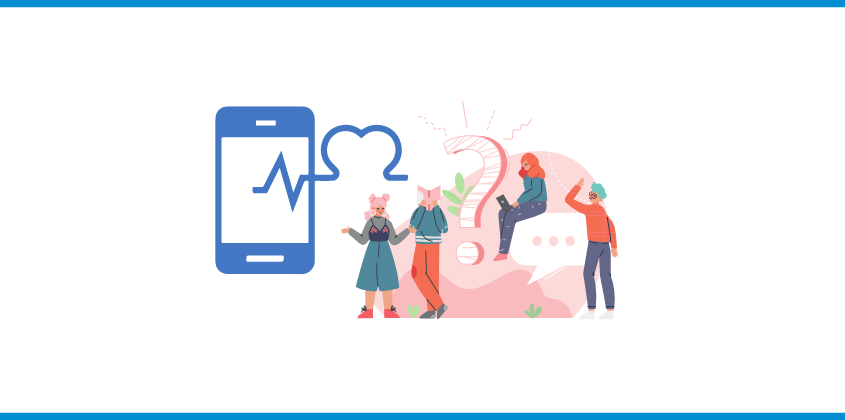Introduction
Welcome to Nextwebi, your trusted partner in healthcare app development! In today's technology-driven world, mobile applications have become an indispensable part of our daily lives. The healthcare industry is no exception, as mobile apps continue to revolutionize the way medical services are delivered and accessed. In this comprehensive blog, we will explore the significance of mobile application development for healthcare, the key differences between health apps and medical apps, types of mobile applications in healthcare, their key features, cost considerations, and how to choose the best company for healthcare application development.
What is Healthcare App Development?
Healthcare app development refers to the process of creating mobile applications specifically designed to address various healthcare needs and challenges. These apps aim to improve patient care, streamline medical processes, provide convenient access to health-related information, and promote overall well-being. From patients and doctors to healthcare providers and administrators, healthcare apps cater to a diverse audience with a wide range of functionalities.
What is the Difference Between a Health App and a Medical App?

While the terms "health app" and "medical app" are sometimes used interchangeably, there are subtle differences between the two:
Health App:
Health apps are consumer-oriented applications that focus on promoting general wellness, fitness, and lifestyle management. They typically include features such as fitness tracking, nutrition monitoring, sleep analysis, meditation guides, and mental health support.
Medical App:
Medical apps, on the other hand, are designed to serve healthcare professionals and institutions. These apps are geared towards assisting in diagnosis, treatment planning, medical record-keeping, medication management, and remote patient monitoring.
Types of Mobile Applications for Healthcare
The versatility of healthcare app development has led to various types of mobile applications catering to different aspects of the medical industry. Some of the prominent types include:
Telemedicine Apps:
Telemedicine apps enable remote consultations between patients and healthcare professionals via video calls or messaging. These apps offer convenience, accessibility, and timely medical advice.
Appointment Scheduling Apps:
These apps simplify the process of booking appointments with doctors and healthcare facilities, reducing waiting times and improving patient satisfaction.
Electronic Health Record (EHR) Systems:
EHR apps facilitate secure storage and management of patients' medical records, enabling healthcare providers to access real-time patient information anytime, anywhere.
Medication Management Apps:
Medication management apps help patients adhere to prescribed medication schedules, set reminders, and receive dosage instructions, reducing the risk of missed doses and potential complications.
Health and Fitness Tracking Apps:
Health and fitness tracking apps monitor various health parameters, such as steps taken, heart rate, calories burned, and sleep patterns, encouraging users to maintain a healthy lifestyle.
Mental Health Apps:
These apps offer mental health support, meditation sessions, stress-relief techniques, and coping strategies, promoting emotional well-being.
Medical Reference Apps:
Medical reference apps provide healthcare professionals with quick access to medical databases, drug interactions, clinical guidelines, and diagnostic tools.
Remote Patient Monitoring (RPM) Apps:
RPM apps enable continuous monitoring of patients with chronic conditions or post-surgery recovery, allowing healthcare providers to intervene promptly if necessary.
Mobile Application Development for Healthcare
At Nextwebi, we understand the critical role of mobile applications in transforming the healthcare sector. Our healthcare app development services encompass the entire process, from ideation and design to deployment and support. Here's how we create cutting-edge healthcare applications:
In-Depth Requirement Analysis:
We conduct comprehensive research and analysis to understand your specific needs, target audience, and objectives.
User-Centric Design:
Our team emphasizes user experience (UX) design, creating intuitive and visually appealing interfaces that engage users and streamline navigation.
Security and Compliance:
Data security and compliance with healthcare regulations are paramount. We implement robust security measures to safeguard sensitive patient information.
Scalable Architecture:
We design scalable app architectures to accommodate future updates, new features, and increasing user demands.
How Mobile Applications are Transforming Healthcare

Mobile applications have ushered in a significant transformation in the healthcare industry, revolutionizing the way medical services are accessed, delivered, and managed. Let's explore the key ways mobile applications are reshaping the healthcare landscape:
Improved Accessibility to Medical Services:
Mobile apps provide patients with immediate access to medical advice, diagnosis, and consultations, reducing the need for physical visits to healthcare facilities. This accessibility is particularly beneficial for individuals in remote or underserved areas who may face challenges in accessing medical care.
Telemedicine and Remote Monitoring:
Telemedicine apps have facilitated the growth of telehealth services, allowing healthcare professionals to conduct virtual consultations and remote patient monitoring. Patients can receive expert medical advice, prescriptions, and ongoing care from the comfort of their homes.
Efficient Health Management:
Mobile health apps empower individuals to manage their health proactively. From tracking vital signs, medication adherence, and fitness activities to monitoring chronic conditions, these apps offer tools for better health management and disease prevention.
Data-Driven Healthcare Decisions:
Healthcare apps generate vast amounts of data, offering valuable insights into patient behaviors, health trends, and treatment outcomes. Healthcare providers can leverage this data to make informed decisions and improve the quality of care.
Personalized and Tailored Care:
Through wearable devices and health tracking apps, patients can receive personalized care plans and interventions based on their specific health needs and goals.
Enhanced Communication and Collaboration:
Mobile apps enable seamless communication and collaboration between healthcare providers, patients, and caregivers. Timely information exchange ensures coordinated care and reduces the risk of medical errors.
Medical Education and Training:
Medical apps serve as valuable resources for medical students, healthcare professionals, and researchers. They offer access to medical references, clinical guidelines, research articles, and educational materials.
Reduced Healthcare Costs:
By promoting preventive care, early intervention, and efficient health management, mobile applications contribute to cost savings in the healthcare system.
Key Features and Functionalities of Healthcare Mobile Apps

The success of a healthcare app hinges on the features and functionalities it offers. Here are some essential elements that Nextwebi incorporates into healthcare applications:
User Registration and Authentication:
Secure user registration and authentication processes ensure that only authorized individuals can access sensitive medical information.
Real-Time Video Consultations:
Telemedicine apps provide seamless video consultations between patients and healthcare professionals, enabling remote diagnosis and treatment.
Medical Record Access:
EHR apps enable patients and healthcare providers to access and update medical records securely.
Medication Reminders:
Medication management apps send timely reminders to patients, ensuring they take their prescribed medications on time.
Health Data Tracking:
Health and fitness tracking apps monitor and record health data, empowering users to track progress and make informed decisions.
Push Notifications:
Push notifications keep users informed about upcoming appointments, test results, and important health-related updates.
Secure Messaging:
In-app messaging enables secure communication between patients and healthcare providers.
Health Tips and Educational Content:
Healthcare apps often provide health tips, educational content, and articles to promote wellness and awareness.
Why Investing in a Mobile Application is Worthwhile
Investing in a healthcare mobile application offers numerous benefits for various stakeholders:
Enhanced Patient Engagement:
Healthcare apps empower patients to take an active role in their healthcare journey, leading to better engagement and improved outcomes.
Convenience and Accessibility:
Mobile apps offer users the convenience of accessing medical services and information at their fingertips, irrespective of their location.
Improved Healthcare Efficiency:
Medical apps streamline administrative tasks, appointment scheduling, and record-keeping, improving the overall efficiency of healthcare operations.
Remote Healthcare Delivery:
Telemedicine apps enable healthcare professionals to provide timely consultations to patients, even in remote or underserved areas.
Data-Driven Insights:
Healthcare apps generate valuable data insights, allowing healthcare providers to analyze patient trends and make data-driven decisions for improved care.
How Much Does It Cost to Develop a Healthcare App?
The cost of healthcare app development can vary depending on several factors, such as app complexity, features, platform (iOS, Android, or both), design complexity, and the development company's location and expertise. As a leading mobile application development company in Bangalore, Nextwebi offers competitive pricing for healthcare app development projects.
Key Considerations when Developing a Healthcare Mobile Application

Creating a successful healthcare mobile application requires careful consideration of various factors:
Regulatory Compliance:
Adhering to healthcare regulations such as HIPAA (Health Insurance Portability and Accountability Act) is essential to protect patient data.
Usability and Accessibility:
Healthcare apps should be user-friendly and accessible to individuals of all ages and abilities.
Integration with Existing Systems: Seamless integration with existing hospital systems and electronic health records is crucial for data continuity.
Security and Privacy:
Robust security measures must be in place to safeguard patient data and prevent unauthorized access.
Testing and Quality Assurance:
Rigorous testing and quality assurance processes ensure that the app functions smoothly and reliably.
Scalability:
The app should be designed to accommodate future growth and additional features.
How to Choose the Best Company for Healthcare Application Development
Selecting the right healthcare app development company is pivotal to the success of your project. Here are some factors to consider when choosing a development partner:
Expertise in Healthcare App Development:
Look for a company with a proven track record in healthcare app development and a deep understanding of the industry's unique challenges.
Portfolio and Client Testimonials:
Review the company's portfolio and seek client testimonials to gauge their capabilities and reliability.
Compliance and Security Measures:
Ensure that the company follows regulatory guidelines and employs robust security practices.
User-Centric Approach:
Partner with a company that prioritizes user experience and designs apps with the end-user in mind.
Post-Development Support:
A reliable development company offers ongoing support and maintenance for your healthcare app.
Conclusion
The advent of mobile application development has transformed the healthcare industry, empowering patients, healthcare providers, and administrators alike. Health and medical apps have emerged as essential tools in promoting wellness, facilitating telemedicine, streamlining healthcare processes, and providing remote patient care. At Nextwebi, we are committed to creating innovative, secure, and user-friendly healthcare applications that cater to your unique needs and objectives. With our expertise as a mobile application development company in Bangalore, we are well-equipped to take on the challenges of healthcare app development. Embark on your journey towards a digitally empowered healthcare system by partnering with Nextwebi, and together, let's revolutionize the way we access and deliver medical services!